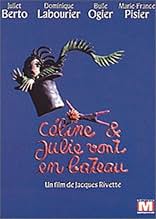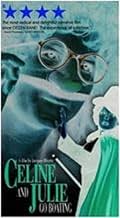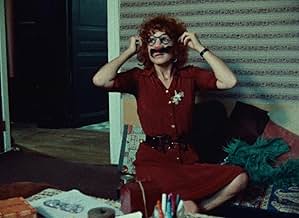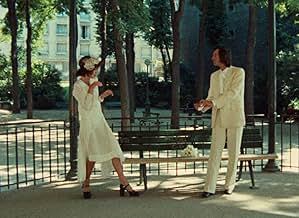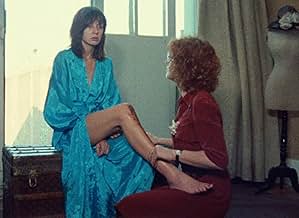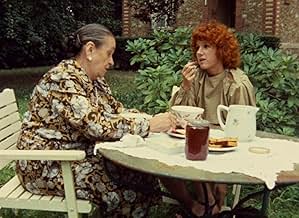Céline et Julie vont en bateau
Titre original : Céline et Julie vont en bateau : Phantom Ladies Over Paris
- 1974
- Tous publics
- 3h 13min
NOTE IMDb
7,2/10
6,8 k
MA NOTE
Un couple de jeunes femmes mystérieusement liées voit leur quotidien préempté par un étrange mélodrame boudoir qui se déroule dans une réalité parallèle hallucinatoire.Un couple de jeunes femmes mystérieusement liées voit leur quotidien préempté par un étrange mélodrame boudoir qui se déroule dans une réalité parallèle hallucinatoire.Un couple de jeunes femmes mystérieusement liées voit leur quotidien préempté par un étrange mélodrame boudoir qui se déroule dans une réalité parallèle hallucinatoire.
- Réalisation
- Scénario
- Casting principal
- Récompenses
- 1 victoire au total
Jean-Claude Biette
- Spectateur au cabaret
- (non crédité)
Jacques Bontemps
- Lecteur à la bibliothèque
- (non crédité)
Michel Caen
- Spectateur au cabaret
- (non crédité)
Avis à la une
10ella-48
As a teenager in the 1970s, I was a frequent visitor to an art gallery in Liverpool called the Open Eye. When they started a film club, promising to show all the stuff I had read about but would never otherwise get a chance to see, I signed up like a flash.
It was a humble affair: a bare room with temporary blackouts on the windows, a makeshift screen at one end, a projector at t'other and a dozen or so ill-assorted chairs inbetween, but I loved it. For me it was a magic grotto: a portal to another place of endless fascination and discovery. It was here that I had my first exposure to the works of Buñuel, Renoir, Fritz Lang; Dziga Vertov's "Man With a Movie Camera"; the experimental shadowgraph animations of Man Ray; David Lynch's Eraserhead and, unforgettably, "Céline et Julie vont en bateau".
Even for one as keen on "Art" cinema as I was, Céline et Julie was a bit of a challenging prospect: a low-budget French thing about god-knows-what, by a director I'd never heard of, that we were warned would run over three hours without interval. Little did I know, as the opening credits rolled, that from then on time would mean nothing and I would be held captive; enthralled; the hours slipping by unheeded, as when dreaming.
It is this quality that, for me, makes this film so special. European (especially French) cinema is full of works that lay claim to the label "Surrealist". I have to say that in my opinion most of them have little to do with the truly surreal at all. More often than not they are simply a cocktail of absurdism and social satire.
Céline et Julie, on the other hand, is a genuinely surreal film possibly the ONLY genuinely surreal film ever made (!) - insomuch that its narrative (and hence the experience of watching it unfold) is uncannily dreamlike. From the outset the viewer is drawn inexorably forward by a teasing sense of curiosity. Frequently along the way there seems to be far too much going on that is unexplained, and little hope of fitting it all together, yet one cannot help but remain in the story. In time, we become aware that our mixed sensations as viewer are mirroring those being experienced by Céline and Julie and thus we find ourselves in that familiar condition of the dreamer: of being simultaneously both onlooker and protagonist in our own drama.
Afterwards, I was left feeling curiously elated, yet struggling to recall its details with any precision. The impressions it had left behind were powerful and thought-provoking, yet intangible, and recalled but imperfectly, in the manner of one who has just awoken: with a frustrating uncertainty as to exactly what had occurred, to whom and in what order. Any attempt to explain it to a third party was equally doomed. Just as with a half-remembered dream, the very act of telling caused the peculiar para-logic of the narrative to disintegrate, and I'd be left speechless.
It's been part of me ever since. Over the last 30-odd years, the themes and images of this film have, in the nicest possible way, haunted me: lurking in the shadows of consciousness, beyond the clumsy reach of rational query, quietly informing my imagination, to appear, unbidden, in subtle and unexpected ways in my own creative output.
The whole strange business has been made all the more uncanny by the fact that, throughout those 30-odd years, the film itself has been lost to me. Having experienced it the once, I was never able to find Céline et Julie again, nor any reference to it, even in the pages of famously trusted and supposedly 'comprehensive' movie guides. Likewise, whenever I mentioned the film in conversation I could never come across anyone who had ever heard of it. Having worked its mischief, the contrary creature had melted back into the half-light, leaving no trace of its existence.
Then, in October of 2006, a miracle: there it was, right in front of me, listed in the TV schedules! Film4 was showing it at the suitably unconscious hour of 3am. Unwilling to risk losing it for another 30 years to the vagaries of my video recorder's dodgy timer, I sat up, my finger hovering nervously over the Record button...
A few days later, having found an afternoon in which we were free of commitments, my partner and I settled in to watch it: she with some scepticism that she would be able to maintain her interest for the whole 3 hours, and me both a-quiver with anticipation and privately praying that, in the hard light of reality, this thing of treasured half-memory would not prove itself to be The Worst Load Of Pretentious Tripe Ever Made.
I needn't have worried. No sooner had I hit "Play" than that fragrant, familiar magic began weaving itself all over again. I am delighted to report that Céline et Julie is just as powerful an experience now as it was in my youth.
What I had forgotten, or perhaps never noticed at all on first viewing, was just what a rough-edged, homespun creature it is in technical terms. It was shot entirely on location, on 16mm and with a very small crew, and it shows. The soundtrack is patchy in places and frequently prey to whatever ambient sounds were present when the camera rolled (usually Parisian traffic noise). Now and then the acting is self-conscious, and some of the reaction shots are clumsily done. In the end, though, none of this matters a damn. Indeed, it is the film's very lack of studio polish that gives it much of its special flavour. Céline et Julie is an imperfect creation, but an honest one. It is also charming, playful and frequently hilarious. As such, I recommend it unreservedly.
It was a humble affair: a bare room with temporary blackouts on the windows, a makeshift screen at one end, a projector at t'other and a dozen or so ill-assorted chairs inbetween, but I loved it. For me it was a magic grotto: a portal to another place of endless fascination and discovery. It was here that I had my first exposure to the works of Buñuel, Renoir, Fritz Lang; Dziga Vertov's "Man With a Movie Camera"; the experimental shadowgraph animations of Man Ray; David Lynch's Eraserhead and, unforgettably, "Céline et Julie vont en bateau".
Even for one as keen on "Art" cinema as I was, Céline et Julie was a bit of a challenging prospect: a low-budget French thing about god-knows-what, by a director I'd never heard of, that we were warned would run over three hours without interval. Little did I know, as the opening credits rolled, that from then on time would mean nothing and I would be held captive; enthralled; the hours slipping by unheeded, as when dreaming.
It is this quality that, for me, makes this film so special. European (especially French) cinema is full of works that lay claim to the label "Surrealist". I have to say that in my opinion most of them have little to do with the truly surreal at all. More often than not they are simply a cocktail of absurdism and social satire.
Céline et Julie, on the other hand, is a genuinely surreal film possibly the ONLY genuinely surreal film ever made (!) - insomuch that its narrative (and hence the experience of watching it unfold) is uncannily dreamlike. From the outset the viewer is drawn inexorably forward by a teasing sense of curiosity. Frequently along the way there seems to be far too much going on that is unexplained, and little hope of fitting it all together, yet one cannot help but remain in the story. In time, we become aware that our mixed sensations as viewer are mirroring those being experienced by Céline and Julie and thus we find ourselves in that familiar condition of the dreamer: of being simultaneously both onlooker and protagonist in our own drama.
Afterwards, I was left feeling curiously elated, yet struggling to recall its details with any precision. The impressions it had left behind were powerful and thought-provoking, yet intangible, and recalled but imperfectly, in the manner of one who has just awoken: with a frustrating uncertainty as to exactly what had occurred, to whom and in what order. Any attempt to explain it to a third party was equally doomed. Just as with a half-remembered dream, the very act of telling caused the peculiar para-logic of the narrative to disintegrate, and I'd be left speechless.
It's been part of me ever since. Over the last 30-odd years, the themes and images of this film have, in the nicest possible way, haunted me: lurking in the shadows of consciousness, beyond the clumsy reach of rational query, quietly informing my imagination, to appear, unbidden, in subtle and unexpected ways in my own creative output.
The whole strange business has been made all the more uncanny by the fact that, throughout those 30-odd years, the film itself has been lost to me. Having experienced it the once, I was never able to find Céline et Julie again, nor any reference to it, even in the pages of famously trusted and supposedly 'comprehensive' movie guides. Likewise, whenever I mentioned the film in conversation I could never come across anyone who had ever heard of it. Having worked its mischief, the contrary creature had melted back into the half-light, leaving no trace of its existence.
Then, in October of 2006, a miracle: there it was, right in front of me, listed in the TV schedules! Film4 was showing it at the suitably unconscious hour of 3am. Unwilling to risk losing it for another 30 years to the vagaries of my video recorder's dodgy timer, I sat up, my finger hovering nervously over the Record button...
A few days later, having found an afternoon in which we were free of commitments, my partner and I settled in to watch it: she with some scepticism that she would be able to maintain her interest for the whole 3 hours, and me both a-quiver with anticipation and privately praying that, in the hard light of reality, this thing of treasured half-memory would not prove itself to be The Worst Load Of Pretentious Tripe Ever Made.
I needn't have worried. No sooner had I hit "Play" than that fragrant, familiar magic began weaving itself all over again. I am delighted to report that Céline et Julie is just as powerful an experience now as it was in my youth.
What I had forgotten, or perhaps never noticed at all on first viewing, was just what a rough-edged, homespun creature it is in technical terms. It was shot entirely on location, on 16mm and with a very small crew, and it shows. The soundtrack is patchy in places and frequently prey to whatever ambient sounds were present when the camera rolled (usually Parisian traffic noise). Now and then the acting is self-conscious, and some of the reaction shots are clumsily done. In the end, though, none of this matters a damn. Indeed, it is the film's very lack of studio polish that gives it much of its special flavour. Céline et Julie is an imperfect creation, but an honest one. It is also charming, playful and frequently hilarious. As such, I recommend it unreservedly.
Last year, at a crisis time of imminent homelessness, I went to the video store with the idea of renting some banal new release to distract me from my troubles. Waiting in line holding a video starring Tom Hanks (or was it Kevin Costner? Maybe it was Julia Roberts. Such a blur is Hollywood today) something in the foreign section an aisle down caught my eye. It was the video for Jacques Rivette's 1974 masterpiece, Celine and Julie Go Boating.
Immediately upon seeing the cover image of Juliet Berto (Celine) posed as a magician, her Dietrich hauteur kinky and comical, I knew it would be my kind of film. I was also pleased to see it was such a long film it had to be contained in a two-video set. It had long been my suspicion that all secrets of life would be revealed in a film over three hours long and in French.
Indeed, Celine and Julie is just that film. But it conceals as it reveals, which is to say that its great mysteriousness results from its floribundance of revelation. Yes, my friend, a floribundance! I never even thought of such a word until seeing Celine and Julie.
Critics have been unable to explain what it's "about". I cannot. I can't explain the plays of Shakespeare or the poems of Emily Dickinson, but I am moved by them. Attempts to understand them can lead to intense mental spasmodics, but the pain, if the work is good, can be great.
Those who've seen the film will remember the hard magic candy the women savored on their own path to understanding. Vision giving, the candy became an addiction to them. Once is never enough and hasn't been for me. I have seen Celine and Julie three times and thought of it many more.
My favorite scene is where Celine performs her weird magic act in a nightclub where, as far as I can tell, the customers are all convicted poets. The atmosphere there is fascinating. Time stops while she does her act, which is beyond words, indescribable. The whole feeling in that scene of a kind of super sophisticated moment of comedy and sex and mystery all shared by a group of people in silence is one that I find marvelously inspiring. Surely some clever entrepreneur in San Francisco, where I reside, could open such a club. Oh, I suppose it won't happen, but at least one can dream.
Really, it's the importance, power and pleasure-pain of dreaming that this film reawakended me to when I saw it months ago. To be like Celine and Julie with their minds moved by candy is a state I aspire to daily.
When I was briefly without a place to live, I thought of this film and was taken to a sunny day in Montmarte, a house where the living and unliving mingle, a library where stalkers and smokers meet. I savored that magic, the effect of great art on the mind, and I knew I was not truly homeless.
Immediately upon seeing the cover image of Juliet Berto (Celine) posed as a magician, her Dietrich hauteur kinky and comical, I knew it would be my kind of film. I was also pleased to see it was such a long film it had to be contained in a two-video set. It had long been my suspicion that all secrets of life would be revealed in a film over three hours long and in French.
Indeed, Celine and Julie is just that film. But it conceals as it reveals, which is to say that its great mysteriousness results from its floribundance of revelation. Yes, my friend, a floribundance! I never even thought of such a word until seeing Celine and Julie.
Critics have been unable to explain what it's "about". I cannot. I can't explain the plays of Shakespeare or the poems of Emily Dickinson, but I am moved by them. Attempts to understand them can lead to intense mental spasmodics, but the pain, if the work is good, can be great.
Those who've seen the film will remember the hard magic candy the women savored on their own path to understanding. Vision giving, the candy became an addiction to them. Once is never enough and hasn't been for me. I have seen Celine and Julie three times and thought of it many more.
My favorite scene is where Celine performs her weird magic act in a nightclub where, as far as I can tell, the customers are all convicted poets. The atmosphere there is fascinating. Time stops while she does her act, which is beyond words, indescribable. The whole feeling in that scene of a kind of super sophisticated moment of comedy and sex and mystery all shared by a group of people in silence is one that I find marvelously inspiring. Surely some clever entrepreneur in San Francisco, where I reside, could open such a club. Oh, I suppose it won't happen, but at least one can dream.
Really, it's the importance, power and pleasure-pain of dreaming that this film reawakended me to when I saw it months ago. To be like Celine and Julie with their minds moved by candy is a state I aspire to daily.
When I was briefly without a place to live, I thought of this film and was taken to a sunny day in Montmarte, a house where the living and unliving mingle, a library where stalkers and smokers meet. I savored that magic, the effect of great art on the mind, and I knew I was not truly homeless.
10EdgarST
I saw "Céline et Julie vont en bateau" a few years after watching "3 Women" and Claudia Weill's "Girlfriends." The next day I saw it again, and then again and again... This was a time when I was very interested in the depiction of modern women in films: some were quite original and revealing, and this was indeed one of them, dealing with the creative process, and women's imagination. Made in 1974, it had a similar origin as that of "3 Women", in which the female cast (Juliet Berto, Dominique Labourier, Bulle Ogier, and Marie-France Pisier) worked with director Rivette and writer Eduardo de Gregorio on the script. It is also a story of female bonding and solidarity, but instead of relying on dreams, it uses magic and literary sources, Lewis Carroll's "Alice in Wonderland" being the first to come to mind. Librarian Julie (Labourier) becomes intrigued by weird rabbit-like magician Céline (Berto), but soon one is after the other. They become friends (or sort of) and exchange roles in each other's life, but nobody seems to notice the difference. Then Céline reveals she frequently goes inside an old house where a melodrama is repeated on and on (based on Henry James' "The Romance of Certain Old Clothes" and "The Other House"), enacted by two women (Ogier, Pisier) who are both in love with a very pale man (filmmaker Barbet Schroeder.) In the old house there is also a little girl (Nathalie Asnar) who is in danger, so Céline and Julie become the "phantom ladies" of the title (including Fantômas outfits) to rescue her. This post-modern movie is a puzzle, and the audience is intellectually involved in the making. Critics went crazy and called it "the most important film made since 'Citizen Kane'." I don't know if it is, but I love it: it is funny, demanding, entertaining, and sometimes boring, in the best tradition of Satie's repetitive "Vexations". Reworked as "Desperately Seeking Susan", without acknowledging it.
When I first saw this film I was amazed by it. The freshness and the imagination of the two protagonists, the way in which it recognised the magic (real magic) of Paris, and the strange parallel worlds it created in which Celine and Julie are both deeply involved and creating, and then acting, their own parts. On re-viewing it more than ten years later though, I was surprised to be a little disappointed. The magic is so thin. Celine and Julie have taken the, very conscious and explicit, decision not to grow up, and as a result, although they are beautiful adults, their world is a child's world. Their imagination is child-like, in its imagery (sweets, plastic "dinosaur eyes", rather thin puns), in its chosen surroundings (cases full of dolls), its disasters (a grazed knee), its aims (largely disruption of the concerns of surrounding adults), in its ridiculing of sexuality and its steadfast refusal to admit that fantasy is sometimes, necessarily, dangerous. Without any danger or any desperation, it seemed on second visit a charming but slightly futile game.
Praised by the critics as "delicate , mysterious, and exiting", "an original and entertaining metaphor for film-watching and, perhaps, film history", and named "The most radical and delightful narrative film since Citizen Kane! The experience of a lifetime" by New York's critic David Thompson, "Celine and Julie Go Boating" (1974) is all of the above but first of all it is incredible fun to watch. This magic candy of a movie tells the story (or rather plays with the story) of two friends, Julie, a librarian and Celine, a magician. The film starts one sunny summer day in Paris when Julie follows running through the park and losing her stuff all over (a scarf, a shoe
) Celine exactly like another girl in the English country side one sunny summer day had followed a White Rabbit into a world of her imagination. Two girls became friends and soon with the help of a magic memory-inducing candy, they both will be the observers and participants in a bizarre soap-opera like drama that takes place in a mysterious house. It involves two stunningly beautiful women, a blonde and a brunette, who are in love with the same man. The man is a widower with a young daughter who had promised his wife that he would not remarry as long as their daughter is alive. When the blonde and the brunette become desperate enough to try to do something about the situation, it is up to Julie and Celine to come up with the plan and to rescue the young girl. Will they go boating? Well, you will have to stay with them for all 193 minutes to find out. Yes, Rivette takes his time but his movie never seems slow or boring. Playful yet complicated, mad and funny, "Celine and Julie" is a magic movie. It grabbed me from the opening scene - which is of course the opening chapter of "Alice in Wonderland" - and it never let go. Buniel would love this movie, I think. It also reminds me of "Mullholand Dr" and even "Persona" but in the absolutely different mode. Simply DELIGHTFUL.
Le saviez-vous
- AnecdotesIt is a misconception that most of the film was improvised by the actors. Jacques Rivette provided structure but did not let his actors "go wild", instead he let them write. A single scene was improvised, where Celine, played by Julie Berto, brags to her associates about her rich American friend. The rest of the scenes where shot from scripted material, mostly thanks to participating actors. The film is collaboration by several authors, including actors Berto, Labourier, Ogier and Pisier. Rivette's involvement in the writing was to give structure to all the contributions, tightening things up.
- GaffesThe last time Julie receives the cigarette from under the table, it is bigger than it was when her colleague handed it to her.
- ConnexionsFeatured in Berlin Chamissoplatz (1980)
Meilleurs choix
Connectez-vous pour évaluer et suivre la liste de favoris afin de recevoir des recommandations personnalisées
- How long is Celine and Julie Go Boating?Alimenté par Alexa
Détails
Box-office
- Montant brut aux États-Unis et au Canada
- 31 452 $US
- Week-end de sortie aux États-Unis et au Canada
- 5 624 $US
- 6 mai 2012
- Montant brut mondial
- 31 452 $US
- Durée3 heures 13 minutes
- Mixage
- Rapport de forme
- 1.37 : 1
Contribuer à cette page
Suggérer une modification ou ajouter du contenu manquant

Lacune principale
By what name was Céline et Julie vont en bateau (1974) officially released in India in English?
Répondre

